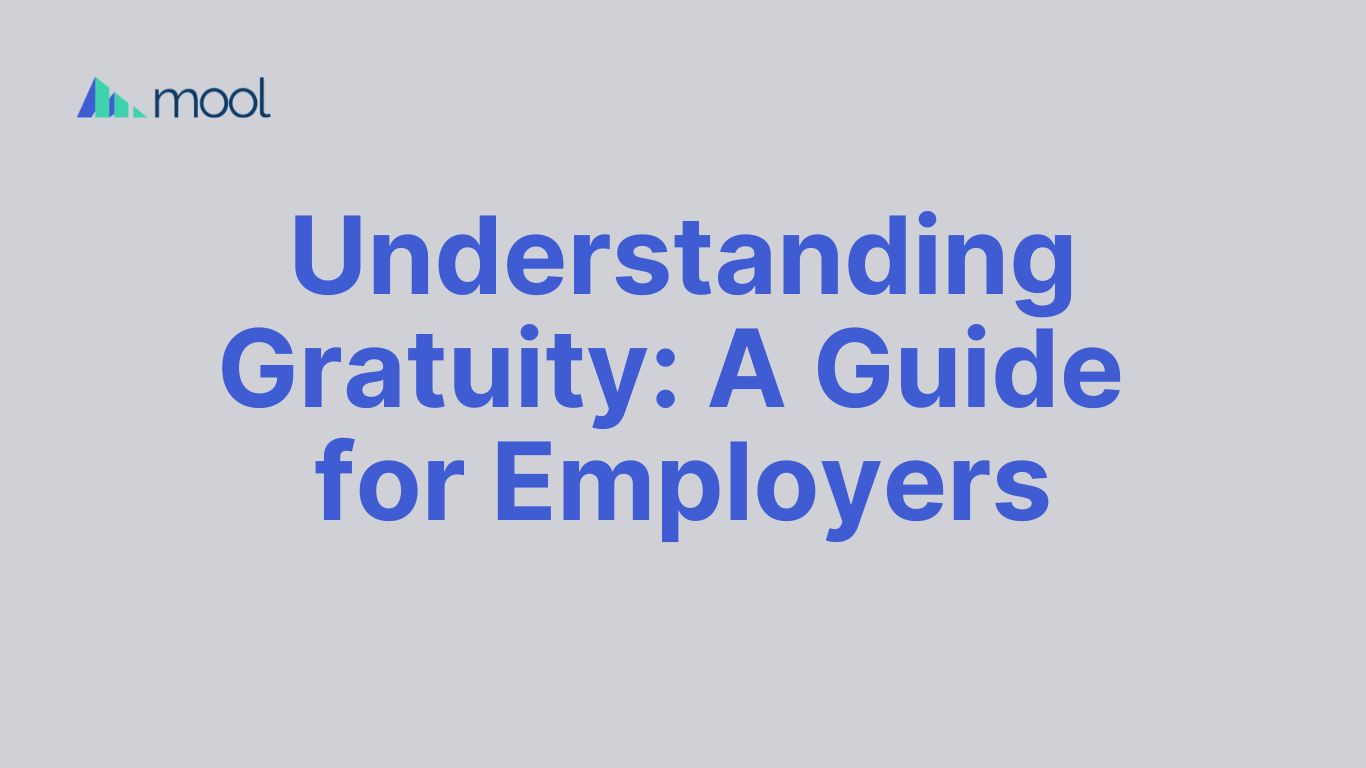Understanding Gratuity: A Comprehensive Guide for Employers
13 Dec, 2024

What is gratuity in salary?
Gratuity is a significant employee benefit that employers are obligated to provide to eligible employees upon their retirement, resignation, or termination of employment. It's a form of retirement benefit that can significantly impact employee morale, retention, and overall organizational reputation.
Why does Mool need Gratuity information?
- Legal Compliance: Providing gratuity is a legal requirement for employers under the Payment of Gratuity Act, 1972. This act makes it mandatory for certain organizations to pay gratuity to their employees who meet the eligibility criteria.
- Policy & Calculations: Whether gratuity is offered in CTC and the tenure for eligibility is crucial for Vetan engine.
Eligibility for Gratuity
To be eligible for gratuity, an employee must meet the following criteria:
- Minimum Service Period: The employee must have completed a minimum of 5 years of continuous service with the organization. However, companies may choose to offer earlier gratuity as well.
- Termination Reason: The termination should not be due to misconduct or gross negligence.
Calculation of Gratuity
The gratuity amount is calculated using the following formula:
Gratuity = (Last drawn salary) x (Number of years of service) x (15/26)
- Last drawn salary: This includes basic salary, dearness allowance, and commission.
- Number of years of service: The total number of completed years of service.
- 15/26: A statutory factor used to calculate the gratuity amount.
What is 15/26 in gratuity calculation?
In the gratuity calculation formula, the fraction 15/26 represents the following:
- 15: This number signifies the number of days' salary considered for gratuity calculation for each completed year of service. In other words, for every year of service, the employee is eligible for gratuity equivalent to 15 days of their last drawn salary.
- 26: This number represents the assumed number of working days in a month, excluding Sundays and other holidays. It's a standard approximation used for gratuity calculations.
Therefore, the fraction 15/26 essentially converts the annual salary into a daily rate, considering a standard working month of 26 days. This daily rate is then multiplied by 15 to determine the gratuity amount for each year of service.
Is gratuity taxable?
Under the Income Tax Act, 1961, gratuity received by an employee upon retirement, resignation, or death is partially exempt. The maximum exempt amount is Rs. 20 lakh. Any amount received above this limit is taxable.
Key Points for Employers:
- Compliance with Labor Laws: Ensure adherence to the Payment of Gratuity Act, 1972, to avoid legal penalties.
- Accurate Record-Keeping: Maintain accurate records of employee service, salary, and other relevant details to calculate gratuity accurately.
- Timely Payment: Disburse gratuity payments promptly upon the employee's retirement, resignation, or termination.
- Tax Implications: Be aware of the tax implications of gratuity payments for both the employer and the employee.
- Consult with Experts: Seek advice from HR professionals or legal experts to ensure compliance and avoid potential disputes.
- Employee Communication: Clearly communicate the gratuity policy to employees to enhance transparency and trust.
Benefits of Offering Gratuity
- Employee Retention: A well-structured gratuity policy can help retain valuable employees.
- Employee Morale: It boosts employee morale and job satisfaction.
- Positive Employer Branding: A generous gratuity policy can enhance the company's reputation as a good employer.
- Legal Compliance: Adhering to gratuity laws can avoid legal issues and penalties.
Conclusion
By understanding the nuances of gratuity and complying with relevant regulations, employers can effectively manage this important employee benefit. A well-implemented gratuity policy can contribute to a positive work environment, employee satisfaction, and long-term organizational success.
Access exclusive content and expert tips by subscribing to our newsletter today!
Mool is a leading financial startup that aims to create a sustainable solution for corporate employees by facilitating effective tax planning, smart investments, insurance, and borrowing options. Mool simplifies the personal financial and taxation jargon and makes it accessible to all. With the products of Mool, organizations and employees can now maximize the value of their salaries without a hassle. Mool’s mission is to create a platform to educate everyone, optimize the growth of their money, and empower them with rich facts and proven analysis for decision making.